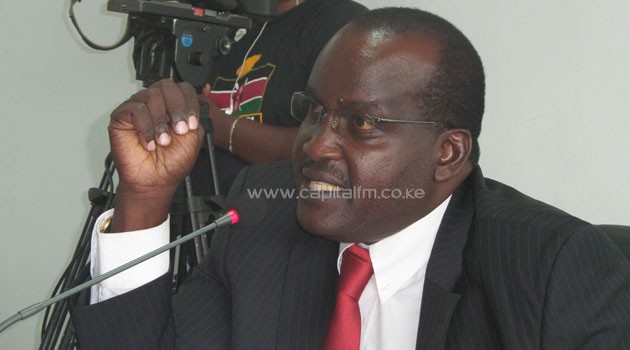
Criminal Investigations Department Deputy Director Gideon Kimilu, Deputy Police reforms director King’ori Mwangi and Peter Pamba of the Administration Police were found fit after the commission’s after allegations against them were unsubstantiated by the complainants/FILE
Criminal Investigations Department Deputy Director Gideon Kimilu, Deputy Police reforms director King’ori Mwangi and Peter Pamba of the Administration Police were found fit after the commission’s after allegations against them were unsubstantiated by the complainants.
The three were among 23 Deputy Commissioners of Police who were vetted which saw two sacked and 18 approved after the exercise.
The commission Chairman Johnstone Kavuludi said the decision to retain the three officers was reached after allegations levelled against them were found to be baseless.
“The decision to retain or retire an officer is a grave matter and will be made based on factual information and not unsubstantiated allegations,” he stated.
“Many people who have raised complaints have shield away from writing statements making it extremely difficult for the commission to hold officers accountable.”
He warned members of the public against giving false information aimed at fixing police officers undergoing vetting.
“Members of the public should desist from giving information calculated to fix officers as the vetting exercise is not a witch-hunt but a noble exercise aimed at reforming the police service,” he said.
He however noted that, “nothing precludes the commission from exercising its power to discipline police officers of whatever rank in line with its mandate regardless of whether such officers have been cleared during the vetting process.”
The commission had been accused by a lobby group of leaving out some issues while grilling the police officers specifically issues of human rights which Kavuludi said they can only act on the issues raised if they have evidence.
“The commission views the issue of human rights violations seriously but these can only be raised where there is a complaint against the officer as the commission cannot base interviews on speculation and rumours. People and organizations with such information are therefore requested to share it with the commission,” he affirmed.
The commission explained why the three had been recalled.
“The commission would like to state it has recalled King’ori Mwangi three times in an effort to ensure that the investigation is thorough and comprehensive,” the chairman revealed.
“The commission had noted that when King’ori Mwangi first appeared before it, he conducted himself in a manner that was disrespectful. In the subsequent interview however, the officer tendered his apology to the commission. Which apology was deemed sincere and therefore was accepted.”
For Kimilu, the commission sought clarification on the sources of his income and property as well as his handling of drug-related cases. The main complaint against Pamba was financial impropriety involving allowances for officers deployed in operational areas.
Kavuludi noted that he was however able to produce relevant documentation and receipts to support the expenditure.
Out of 23 police officers in the second phase, only two were sacked. Eusebius Laibuta who was in charge of the Senior Administration Police College was found unsuitable to continue serving alongside Philip Tuimur who formerly served as the North Eastern Provincial Police chief.
The vetting process is being conducted pursuant to the provisions of the Constitution Article 246 and National Police Service Act (2011) Section 7(2) and (3) which stipulate that members of the National Police Service shall undergo vetting to assess their suitability and competence.
The overall objective of the vetting is to build confidence and trust in the National Police Service.
The applicable vetting standards include officers’ satisfaction of entry and training requirements, their professional conduct and discipline, integrity, financial probity, and respect for human rights.
The third phase will start on February 14 and ends on March 8 where four panels chaired by a member of the NPSC will undertake the exercise where 182 senior Assistant Commissioners of police and Assistant commissioners will be vetted.








































